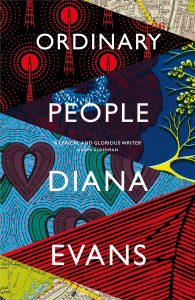 Published by Chatto & Windus 5 April 2018
Published by Chatto & Windus 5 April 2018
336pp, hardback, £14.99
Reviewed by Zoë Fairbairns
This will be the second time that the Queen’s Hotel in the south London suburb of Crystal Palace has turned up in my bookoxygen reviews. But I haven’t got a product-placement deal. It’s just that it keeps appearing in books.
In Michael Rosen’s The Disappearance of Emile Zola, it was a real hiding place for the French novelist when he fled from 1890s France to avoid going to prison for something he had written. But in Diana Evans’ latest novel, Ordinary People, this ‘vast, cream-coloured building in the colonial style (with) flags of the world adrift on the roof’ is a different kind of bolthole: it’s where a stressed-out twenty-first-century father and breadwinner seeks refuge from domesticity.
Rosen’s book was quite dismissive about the area, declaring that it was ‘almost farcical’ that a man of Zola’s grandeur should end up in a down-at-heel south London suburb; but Diana Evans, who lives in the area and has heard all the north Londoners’ whinges about the fates that await them if they dare to cross the river (satnav malfunctions, nosebleeds) is afflicted by no such snobbery. Her book is not just a lyrically-told, emotionally-honest tale of two early-middle-aged, mixed-race couples struggling with parenthood and domestic strife; it also reads in places like a love-song to south London, and to the Crystal Palace area in particular.
Speaking recently to a packed gathering in the area’s hospitable and well-stocked independent bookshop Bookseller Crow, Diana Evans drew analogies between the history of the original Crystal Palace and the love stories (and out-of-love stories) of some of her characters. The Palace itself was first erected in Hyde Park – ‘that showy glass kingdom in the heart of London’s prime green space’ – but, like Michael and Melissa in the book a century and a half later, moved south for economic reasons, to a new home ‘in a wilderness of oak trees on the panoramic summit on Sydenham Hill’. The relocated Palace throve for a while, as did Michael and Melissa’s love. But the Palace burned down in 1936.
Now, in the twenty-first century, Melissa wanders among the ruins. ‘She found a headless woman among the grasses, a broken statue from the days of glory. Melissa felt connected to the statue.’ A moment of sexual disappointment with Michael is expressed in terms of the lost glories of the Palace: ‘The mummies in the Egyptian Court were vanishing. The statues in the Roman Court were withering. The flowers at the entrance to the Assyrian Court were dying.’
Feeling trapped in motherhood, Melissa resents the loss of her journalistic career, and the apparent ease with which Michael is able to continue his own professional life. He in turn feels that his role as breadwinner is unappreciated. He has a sexual fling with a work colleague, realizing too late when he sees her impoverished flat, how much he loves the home he shares with Melissa and the comforts she creates there.
Tales of couples in conflict are played out against the south London background of urban beauty and ugliness, toddler play groups and knife crime, sandwich dilemmas in Prêt A Manger, retail therapy in Top Shop, hauntings, snowfall, and visits from Rentokil. Issues of cultural identity nag at the characters: when Melissa explains to her seven year old daughter Ria that Ria is ‘a quarter Nigerian, a quarter English and half-Jamaican’, Ria replies that she wants to be ‘completely Jamaican too… I want to be all of them.’
Ria’s school puts on a parents’ evening to celebrate the multicultural nature of the area; Michael, for reasons that are not (on this occasion) his fault, turns up late. Melissa’s reaction is icy: ‘They fell to distances. Her body forgot his hands. They were partners, in the very tedious sense of the word…’ Michael for his part feels no need to be reminded about multiculturalism, haunted as he by the history of slavery, by images of burning churches and dead children from the civil rights era in the US, and, more recently and nearby, the Stephen Lawrence case.
In an effort at reconciliation, Michael and Melissa bring in a babysitter and go out on a date (‘Open air! Childlessness! Pramlessness!’). They head for Crystal Palace’s burgeoning restaurant area – ‘hand-in-hand, they emerged on to the street on to this rolling, hilly town on the far south edge of London, where from the pinnacles of the steeps the city centre is a shimmering valley view of many coloured lights. You can hear seagulls, possibly bound for Brighton, it is so far out it has a seaside sensation…’
If Diana Evans keeps writing about the area and its people with such lyricism and enthusiasm, Crystal Palace will become fashionable, and what will happen to house prices then?
